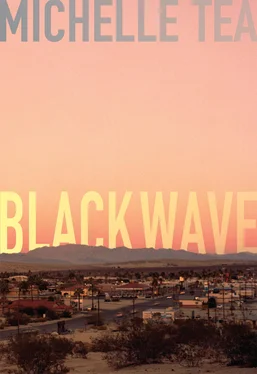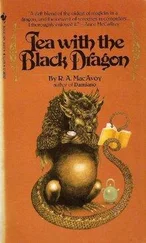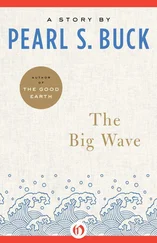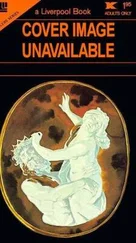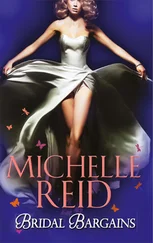I Can’t Believe You Got A Grant, Michelle said. I Want To Come Back To San Francisco And Get A Grant. I’m Going To Kick That Olympia Girl Out Of My Room And Come Back.
You can’t, Ziggy said. You can’t come back. Didn’t you hear?
Hear What?
About your house? About Clovis? He got hit by a soda truck the morning you moved. Like minutes after you left, I swear. If you had left any later you would have fucking seen it happen. It happened right outside your house. Your old house.
Oh, Michelle said, Oh No. Sweet Clovis, a humble, bent landlord. He had nursed his cancer-stricken wife until death there inside that second-floor apartment, and so he could never leave it. Her spirit could be lingering, Clovis could not risk abandoning it. He sang to it on the karaoke machine. He had pledged not to raise their rent to profit from the housing-mad dot-com millionaires. He had promised not to sell and he hadn’t. He died as broke as anyone, owning a piece of property suddenly worth millions. Michelle cried for how hard his life had been. There was no redemption for Clovis. If there was no redemption for Clovis, why should there be any redemption for anyone? Why, Michelle fumed, did the people demand redemption from their literature? She vowed to make the straight, male version of herself get whacked by a soda truck in the first chapter, after smoking crack with a vanful of lesbians to try to get over his dead wife.
What Will Happen To The House? Michelle asked. That old house was a monument, the city should have bolted a plaque to its doors. Every queer female artist to have a drug problem in San Francisco within the last twenty years had lived in it.
It already happened, Ziggy said. New owners, the place looks totally different, they painted it and put these ugly doors on it and a gate on the stoop so no one can sit there. Everyone got money, they all got paid to get evicted. A couple thousand each, I think.
Bile burned in Michelle’s belly, giving her an instantaneous ulcer. Seven years she’d suffered there — suffered the roaches, the gangrenous shower, the criminal neighborhood, the fuses that blew every time she plugged in a hair dryer. And when the big payout came she was gone. In Los Angeles. Broke as ever, alone. Michelle thought of Ekundayo getting thousands of dollars, moody Ekundayo who had made her feel like a trespasser in her own home, a bother, an interloper, though she’d lived there a hundred times longer than anyone. Ekundayo who’d spearheaded the effort to paint the living room psych-ward green. Cursed Ekundayo! And that Oly girl! There but a month or two and paid cash money to evacuate! Only Stitch deserved it, Michelle thought. Stitch who’d lived there nearly as long as she had, caretaking the cockroaches. Why hadn’t Stitch called her and told her this had happened? Michelle and Stitch loved Clovis, they’d talked endlessly about having him up for dinner but never got around to cleaning the kitchen.
How’s Stitch? Michelle asked. What’s Stitch Doing?
Stitch went to Prague, Ziggy reported. She’s gone.
Prague? Prague? Why Prague? What The Fuck’s In Prague?
Beer. Her ancestors. She’s Praguian. She’s got cousins there.
No Way.
She had a big party about a month ago.
She’s Been Gone That Long?
Uh-huh.
The crackle in Ziggy’s cell flared and became deafening. Michelle hollered into the receiver, trying to locate her friend, but the call had been dropped. She flung her landline into its base and dropped herself onto the futon. Michelle cried. It was like she had climbed out of a hole and the hole had closed itself behind her. She felt profoundly cut off from herself. That room in that house was the last affordable room in San Francisco. Her studio apartment, a cozy place, grew creepily cozier as the walls closed in on her. She’d left her heart in San Francisco, in that shabby Victorian with the haunted bathroom and the cigarettes ground into the floor, her glittered, moldy bedroom and the beer bottles rolled against the walls. She had only wanted a change of scenery, a strange vacation to clear her head. But without that house to return to, Michelle was trapped in Los Angeles.
She had seen the exiled try to come back. They wore out their welcome sleeping on couches until, truly homeless, they were forced into unfathomable situations, returning home to live with their parents. Michelle checked the digital alarm clock plugged into the wall by the bed. She could cry for twenty minutes and then she was due at the bookstore. She stuffed her face into a pillow and wept, then climbed from her futon and into her new life.
Michelle’s bookstore was owned by a husband-and-wife team. Beatrice was thin and wan and visibly repressed. She spoke in a hushed tone and seemed perpetually on the verge of tears. Sometimes Michelle wondered if Beatrice was in fact crying, the way her voice creaked and croaked and her eyes grew red and teary. Perhaps Beatrice had been so depressed for so long she had mastered the art of continuously weeping in public, a subtle sobbing that friends and customers chalked up to allergies or simply the state of her face. She was prone to migraines, and when her headaches came on she left Michelle alone in the vast bookstore. That was the best. Michelle would drift dreamily from pile to pile, lifting the grimy, sneezy books, reading a bit from this and a bit from that, Basquiat and Bukowski, lesbian anthologies from the 1970s, Margaret Mead and Carl Jung and Hollywood Babylon .
Beatrice’s husband was sick with an esophageal disorder that sent acidic bile and undigested food rolling up his throat whenever he bent over. He would come to work in spite of his distress to remind everyone of his kingly role. He would trail Michelle through the store, pointing to various things on the floor, having her bend and lift them. He was a bulky man and liked to linger in the kiosk behind the register. Michelle would be there too, and Beatrice, and mounds of books — books that had arrived that day in the arms of hopeful strangers, quality books, rare or antiquated, out-of-print or cult classics that the couple sold on eBay. No one in the kiosk could move. Michelle practically gave the husband a lap dance each time she came behind the register. It was hectic at the bookstore. Though it should have had the sleepy, cozy feel of a library, when the owners were around it felt like an ER, like a single detail might be being overlooked that would cause this empire of used paperbacks to crumble.
In thirty years of owning the store, the husband had never learned how to operate the cash register. Michelle felt this was all she needed to know in order to understand Beatrice and the source of her headaches. The husband possessed a vast knowledge of classical music recordings and that was his role in the operation, judging the quality of the classical records people came to sell and cultivating a community of classical music nuts to purchase them. Otherwise, he condescended and lorded over them and complained about his esophagus. His irritation was oddly exuberant, like he was an actor playing the part of the cranky bookstore jerk, long white hair cascading from his head and face. Sometimes he and Beatrice would fight and Michelle would be trapped there, hemmed in by the books, caught inside their dysfunctional relationship.
If Michelle hated working with the owners, she adored working with Joey, the gay manager who wore a do-rag and had the lyrics to Lil’ Kim’s entire oeuvre memorized. Together they bided their time until the owners left, then swapped out the acceptable bookstore jams — Norah Jones, Aimee Mann — for Lil’ Kim, Tupac, and Marilyn Manson. Working with Joey was fun, the most social activity Michelle was getting in Los Angeles, but she still preferred working alone, the time careening by as she lounged on a ladder with her nose in a book: Violette Leduc, Phoebe Gloeckner, Monique Wittig. The bookstore was a treasure chest, stuffed with books by publishers and writers who long ago had failed. This was the last place left to find them, a cemetery of sorts. It was her favorite place in all Los Angeles.
Читать дальше
